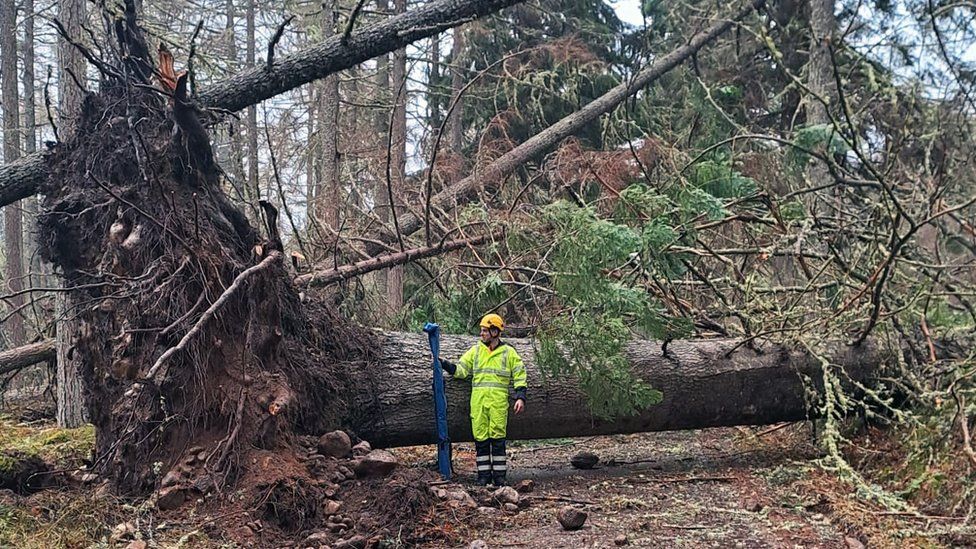 Image source, SSEN
Image source, SSEN
SSEN crews were working to restore power after storm damage near Fort Augustus
Around 1,500 homes have had another night without power after Storm Gerrit brought snow and floods to Scotland.
Power company SSEN said it had managed to restore supplies to more than 46,000 properties, with residents in the north east and Shetland worst affected.
It comes after houses in Cupar, Fife, were flooded while drivers on the A9 in the Highlands were stranded by snow.
Meanwhile, three men died after a 4x4 vehicle went into the River Esk near Glaisdale in North Yorkshire, an area badly affected by flooding.
In Scotland, officials said rail services north of Perth and Dundee were shut down with key routes between Aberdeen, Dundee and Inverness closed.
Network Rail Scotland said teams were still working round the clock to reopen routes.
In Fife, the line between Cupar and Dundee remains closed due to a landslip.
In the Highlands a telegraph pole that fell on the tracks near Helmsdale blocked the line between Tain and Wick.
Trains between Dumfries and Kilmarnock are expected to remain cancelled until later on Friday because of landslip debris on the tracks near Sanquhar.
Image source, Network Rail
Image caption,Network Rail said its teams were still working to reopen routes.
There was also flooding in the Whitesands area of Dumfries and on the A96 at Huntly, while trees have fallen across the A82 south of Invergarry.
Meanwhile six people were rescued from vehicles stuck in flood water in Banchory, the Scottish Fire and Rescue Service said. No injuries were reported.
SSEN said about 14,000 homes were left without power overnight on Wednesday.
More than 2,000 were in Shetland, while the rest were spread over the Highlands, Argyll, Orkney, Tayside and central Scotland and the north east.
Welfare vans serving hot food and drink were set up in affected areas.
High winds damaged the roof of the Shetland Hotel in Lerwick
Graeme Keddie, SSEN's director of corporate affairs, apologised to affected customers, adding: "We're doing all that we can to restore supplies as soon as possible."
He told BBC Radio's Good Morning Scotland that engineers had made "really good progress" despite "extremely tough conditions".
SSEN said customers should visit the Power Track website.
Mr Keddie insisted the firm had made "big improvements" on its main network and customer communications after thousands were left without power for a week following Storm Arwen in 2021.
Image source, Bear Scotland
Image caption,The A9 at Scrabster, Caithness, was blocked by a landslide
The Met Office issued had a yellow weather warning for much of Scotland on Wednesday.
A warning covering Shetland was extended until 06:00 on Thursday, with Lerwick registering its strongest wind gust in seven years at 83mph.
A major incident was declared by Highland Council as the A9 was shut for hours due to heavy snow, leaving drivers trapped in their vehicles near the Pass of Drumochter.
Caledonian Sleeper services, to and from Aberdeen, Inverness and Fort William, were cancelled on Wednesday night while the British Transport Police was called out to reports that a train had been struck by a tree near Broughty Ferry station.
Pictures showed extensive damage to the driver's cab.
Th Rail Accident Investigation Branch said it was "in the process of gathering information" and the incident would be reviewed in the coming days.
Mohamed Khalid of Ali's Discount Store in Cupar
Welfare vans serving hot food were set up in Fort Augustus and other affected areas
In Cupar, Mohamed Khalid of Ali's Discount Store estimated flooding had caused £150,000 of damage to his shop.
"Everything has been turned upside down really in the shop," he told BBC Scotland.
"We don't know where to begin with the clean up procedure."
David Duguid, Conservative MP for Banff and Buchan, raised concerns that an amber alert should have been in place.
"The effect of the weather in north east Scotland in last 24 hours has felt far more serious than 'yellow'," he posted on X, formerly Twitter. "Many of my constituents asking why this wasn't amber."
A Met Office spokesperson told BBC Scotland News that the warning was not raised to amber because "the likelihood of disruption on a county scale remained too low to escalate until a very short lead time".
They added: "Once impacts were observed the benefit of escalation would have been very limited as emergency services were already responding to the situation.
"We will review the efficiency of the warnings as part of this event as usual in the coming days."
Travellers are facing disruption as Storm Gerrit hits Scotland
Power went off in the village of Tarland, Aberdeenshire, from about 10:00 on Wednesday morning.
Anne Keith told BBC Scotland News that residents knew to stock up on supplies following Storm Arwen.
"We were all ready," she said. "Candles to the ready, power packs to the ready. So it wasn't too bad."
Alick Bergman said he had a "rough night" after a power cut forced him and his children to shelter at his parents' house.
But he had no complaints about the Met Office warning system.
"Weather is a fickle beast," he said.
"Sometimes they'll put out an amber warning and it doesn't amount to much. Sometimes you don't get a warning at all and it's pretty horrendous. They do the best they can."
Residents were rescued from homes in Cupar, Fife, on Wednesday
Stein Connelly, head of transport resilience at Transport Scotland, said: "The weather has improved and the Met Office warnings have ended, but people may still encounter difficult driving conditions due to surface water and flooding.
"We continue to ask people to plan ahead, to drive appropriately and to take care out on the road network."
CalMac said some ferry services on Thursday were at risk of disruption or cancellation at short notice.
The operator said the latest information on delays and disruption to other routes was available on the CalMac website.
NorthLink services across the Pentland Firth to Orkney were also at risk of disruption.
First Minister Humza Yousaf said the Scottish government's resilience operation had been activated on Wednesday evening.
How have you been affected by Storm Gerrit? Tell us your story by emailing: haveyoursay@bbc.co.uk.
You can also get in touch in the following ways:
If you are reading this page and can't see the form you will need to visit the mobile version of the BBC website to submit your question or comment or you can email us at HaveYourSay@bbc.co.uk. Please include your name, age and location with any submission.
 (1).png)
 1 year ago
19
1 year ago
19


















